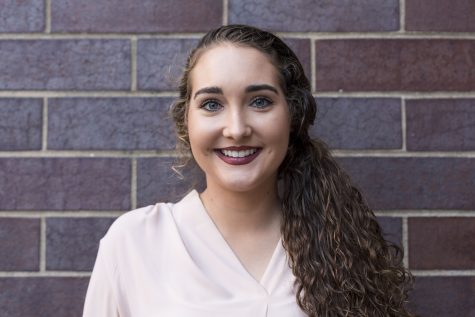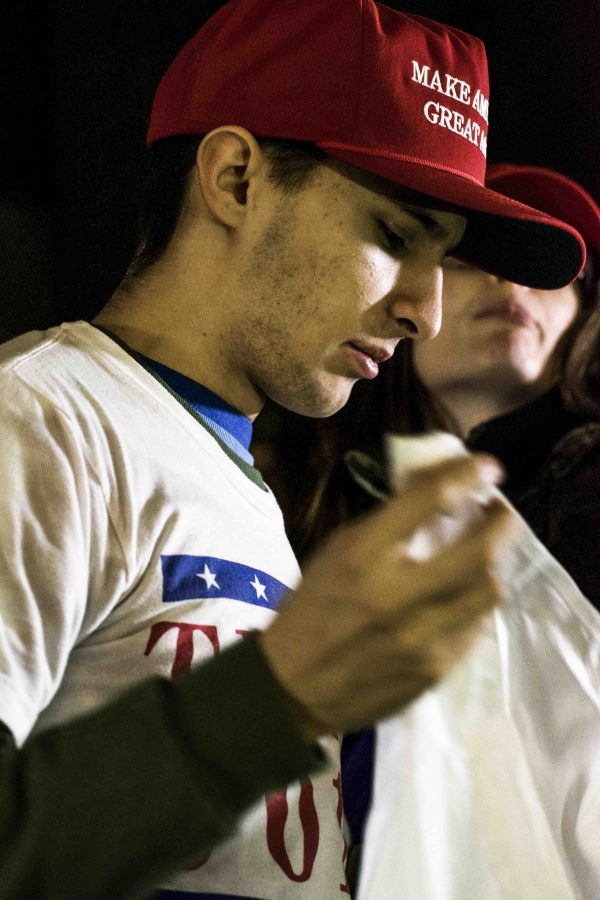Southern Voters Fret Over Trump’s Legacy
A Trump supporter stands outside of the Hilton in New York on the night of the Election.
The crude commentary surrounding this election has left many first time voters disillusioned, with some feeling that the rampant name calling and blatant contempt the candidates felt toward each other overshadowed the importance of electing the
next president.
Animosity between the two major political parties was amplified by the Republican nominee’s headline-grabbing remarks on everything from his opponent to members of his own party. Real estate mogul Donald Trump’s campaign is probably known more for his outlandish statements during rallies and on social media instead of his actual policy platforms.
The celebrity-turned-politician faced numerous allegations that his rhetoric riled voters and incited hatred toward minority communities. And some NYU students, particularly those from conservative states, were worried that the Trump campaign had re-ignited — and perhaps legitimized on a national stage — stereotypes that have long been associated with the South.
While some students say that the liberal-leaning political climate of NYU impacted how they viewed the election and ultimately how they voted, most students from conservative backgrounds were primarily concerned with how Trump’s dialogue morphed into the collective representation of southerners.
Tisch junior Sarah Proctor said she has been personally embarrassed at times to say that she is from Mississippi because of how wholeheartedly the state has supported Trump. She said that the rise of the Republican nominee had brought further out anti-gay and anti-immigration stances already prevalent in southern states, and as a result, Proctor said she felt pressured to qualify her political beliefs or else students would assume she supports a man with “low moral character.”
“I think for the most part, I established my own beliefs while I was still back home in Mississippi just by seeing what I didn’t like in those around me and the bigotry that surrounded me everyday,” Proctor said. “I am a self-proclaimed moderate, raised by a Republican and conservative household and then came to my own conclusions. But being at NYU has definitely opened my eyes and perhaps maybe made me sway a little more left than I would have previously.”
As a first time voter, Proctor said she was disappointed that neither candidate was particularly appealing to her. However, Proctor said she voted for Hillary Clinton by absentee ballot in Mississippi instead of voting in New York, as she felt this could have been the first time in recent history the predominantly red state could have turned blue.
Tandon freshman Karan Ganta said being a student at NYU had not swayed his political views at all because he came to college identifying as a Democrat. However, Ganta said that the university has encouraged him to be more considerate when addressing others — something that doesn’t happen in his hometown of Alpharetta, Georgia.
He added that many people back home tend to ignore differing opinions, and he thinks that the election only reinforces widespread beliefs of the South being a bastion of regressive politics, particularly when southerners began defending Trump’s sexual harassment allegations.
“Examples of southern people like this really push that harsh stereotype of the incestuous, Confederate rednecks that make up the South, and the media only shows these extreme cases of people to help discredit those in the Republican party,” Ganta said. “For myself, it brought out some of the more radical sides of friends that I never thought would side that way.”
In addition, Ganta said he felt Trump reinforced divides that have come to be associated with the South, such as racist and sexist sentiments. With Trump winning the presidency, Ganta fears the election has created lasting effects that will cause those who lean right to dismiss certain political and social movements, such as the Black Lives Matter movement.
Gallatin freshman Pamela Jew said that although she was raised in Georgia, her parents didn’t push any political views on her. Jew said she came to NYU as a liberal and the political climate of the school has only enhanced her disdain toward Trump. In addition, Jew said his statements have enforced what she thinks is a close-minded approach some southerners take when interacting with others from different backgrounds or political beliefs.
“I think in the South, through this election, people are growing into more of the phobias and social constructions that they’ve made,” Jew said. “If the presidential candidate that [people] favored says it’s okay, they’re like ‘oh yeah, I can go with it too’ and [they] can be more of that sort of non-accepting person.”
Although this election was unconventional to say the least, students are concerned that Trump’s rhetoric has amplified stereotypes that have come to be associated with the South.
And while voters are relieved that the tumultuous election season is finally over, students from southern states are left wondering whether Trump’s controversial statements will have a longstanding impact on how they’re viewed, even if they never supported the billionaire to begin with.
Editor’s note: Pamela Jew has written for WSN.
A version of this article appeared in the WSN 2016 Election Issue. Email Lexi Faunce at [email protected].

Lexi Faunce is a junior studying journalism and politics, and she will be joining WSN this semester as the Investigative News Editor. She hails from the...
























































































































































